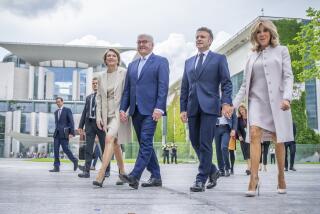France Outlines Plan for a ‘Pioneer Group’ to Redefine the EU
- Share via
BERLIN — Galvanizing the quest for a stronger Europe and a counterweight to the United States, French President Jacques Chirac called Tuesday for a “pioneer group” of countries led by his nation and Germany to reform and expand the European Union.
The proposal, made in a speech to the German Parliament, gave impetus to an idea floated last month by German Foreign Minister Joschka Fischer for a Franco-German “core” to reinvigorate European integration and define the vision of a politically and economically powerful bloc.
French politicians initially recoiled from Fischer’s musings on a European federation with a common parliament and constitution. But Chirac’s address to the Bundestag, culminating a two-day state visit here, showed that the Continent’s powerhouses are now moving along much the same track.
“It is essential that countries wanting to move more quickly toward integration are able to do so on a voluntary basis and define projects without being held back by those nations which, as is their right, do not want to move forward so quickly,” Chirac told the assembled German political elite.
Britain has reacted coolly to the plan, deeming it a formula for division that would relegate smaller EU nations to the rear of a “two-speed Europe.” But French and German officials have observed that it is Britain that is frustrating unity within the current 15-state alliance with its refusal to join the common currency, the euro.
France takes over the rotating EU presidency this weekend and will be in a position to advance the changes Chirac outlined in his speech, in an effort to streamline decision-making and give more voting clout to the most economically influential countries.
All major EU decisions now must be approved by a unanimous vote of the 15 members, a system that shackles and threatens to paralyze the alliance if the number of member states doubles with a planned expansion to include nations in southern and eastern Europe.
“A Europe that can be strong on the international scene must have strong institutions and an efficient and legitimate decision-making mechanism that gives proper place to majority votes and reflects the relative weight of its members,” Chirac said in the address seen as the blueprint for France’s six-month EU presidency.
Fischer touched off debate six weeks ago when he outlined his “personal vision” of a more flexible and integrated EU that would be better able to accommodate another 15 members if all were under a single federal umbrella. France and Britain retain powerful allegiance to the concept of nation states, and Chirac made clear that, even in an expanded EU, his country would preserve its sovereignty and national identity.
“Neither you nor we envision the creation of a European superstate that would take the place of our nations and signal the end of their existence as actors on the international stage,” the French president said.
Chirac even embraced the idea of a continental constitution “after a few years” but noted that the trailblazing core of states he was proposing could get to work without a formal federal agreement.
As did Fischer, Chirac noted that the “pioneer group” would be open to other states wanting to take the initiative to jump-start an integration process that has in recent years become bogged down in the dull work of harmonizing policies on everything from farm subsidies to defense.
“There are moments when one must know how to take risks, leave the beaten path,” he said. “That is the price of the great adventure of this community.”
The French president also told the German lawmakers that he supports Berlin’s hopes of gaining a permanent seat on the United Nations Security Council. That endorsement indicated a growing comfort level in Paris with Germany’s desire to acquire more clout by virtue of being the world’s third-largest economy.
“For the building of a united Europe to advance, it is first and foremost French-German friendship that we must deepen constantly,” Chirac told the Bundestag in the first address to the body by a foreign head of state since the historic Reichstag building reopened 14 months ago to signal Berlin’s reincarnation as the German capital.
At a dinner held in Chirac’s honor the night before, German President Johannes Rau made a similar appeal for joint action to speed European integration while protecting the “cultural wealth and historical identities” of their nation states.
Germany and France enjoyed a much more dynamic political relationship in the years when former Chancellor Helmut Kohl and late President Francois Mitterrand were the driving forces in construction of a united Europe. But the most crucial partnership on the Continent has lately been bolstered by the common Franco-German desire to raise the power and prosperity of the EU by collaborating on much-needed administrative reforms.
More to Read
Sign up for Essential California
The most important California stories and recommendations in your inbox every morning.
You may occasionally receive promotional content from the Los Angeles Times.














